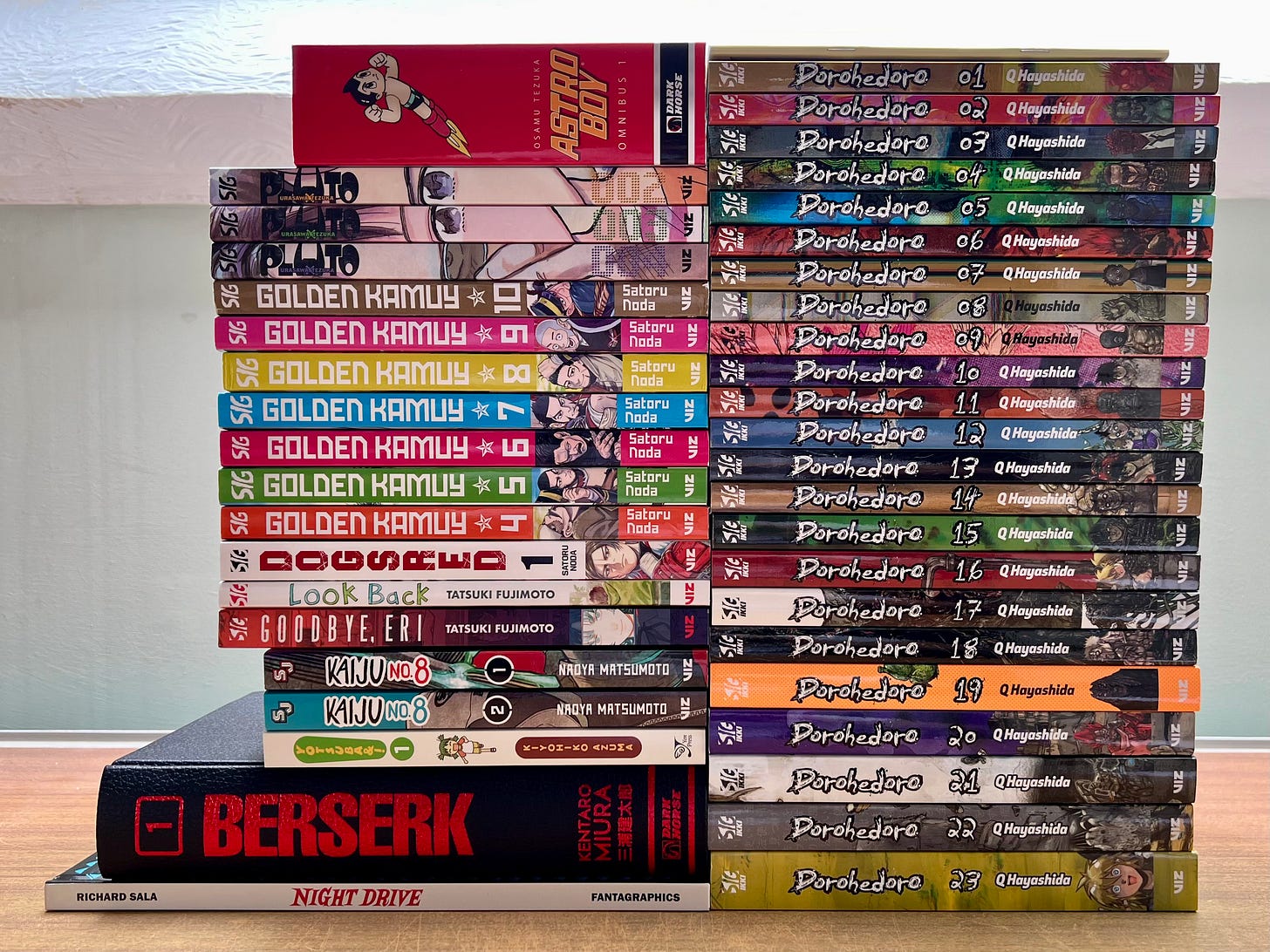Graphic novels read in June 2025
Dorohedoro by Q Hayashida (9/10)
Golden Kamuy vols 4-10 by Satoru Noda (9/10 bears)
Berserk Deluxe vol 1 by Kentaro Miura (9/10)
Pluto vols 2-4 by Naoki Urasawa together with Astro Boy: The Greatest Robot on Earth short story by Osamu Tezuka (9/10)
Look Back by Tatsuki Fujimoto (8/10)
Dogsred vol 1 by Satoru Noda (8/10)
Goodbye, Eri by Tatsuki Fujimoto (7/10)
Kaiju No.8 vols 1-2 by Naoya Matsumoto (7/10)
Yotsuba&! vol 1 by Kiyohiko Azuma (7/10)
Night Drive by Richard Sala (6/10)
What the Witch Saw by Thomas Heitler (6/10)
This month was again mostly about exploring manga. Something that I had not appreciated before is how long successful manga series can go on for. I was very impressed with Claremont’s 16 year run on the X-Men and Bendis and Bagley’s 111 issue run on the (original) Ultimate Spider-man. But when I finished Dorohedoro, it struck me that it was written and drawn by the same person for 18 years and had 190 chapters (counting the Extra Evil bonus chapters)! And it’s not even that long a series by manga standards. I’m very curious as to how manga stories evolve and change (or maybe stay consistent) despite the over such large amounts of real time.
What I am also finding is that the first volumes often have just the basic outlines of the setting and main characters, with further important characters and complications being rapidly introduced at an exponential rate in subsequent volumes. This was definitely the case with Dorohedoro, which for all its originality, did not grab me until vol 3. Once it got going though, it was impossible to stop!
Dorohedoro was pretty special. The characters get up to some brutal stuff, yet they care about one another and are so endearing, that I couldn’t help but care for them too. It manages to be both a gory and grotesque horror story and a heart-warming tale of friends and family coming together to eat some delicious gyoza (or mushrooms). It’s a weird mix, it probably shouldn’t work if you think too much about it, but it does work and kept me reading through to the end. It’s very inventive, fast-paced and if you like heavy metal aesthetics, you’ll love this.
I won’t say too much about Golden Kamuy or Berserk for now as I’m busy reading the series and dodging spoilers. Really enjoying them both and, so far, they are only getting better.
Pluto vols 2-4 is a slower and gentler seinen than the above. When I started it, I wasn’t actually aware that it was a remake of Tezuka’s short story Astro Boy: The Greatest Robot on Earth. When I learned that it was written for a Japanese audience with the expectation that readers would be familiar with Astro Boy: The Greatest Robot on Earth, I decided to read that too. I am now enjoying reading Pluto much more because a lot of the enjoyment is in seeing how Urasawa is riffing on the original and playing with readers’ expectations.
Speaking of expectations, Fujimoto is an expert at building up readers’ expectations before flipping those expectations on their head! In fact, I learned that there is a Japanse and Chinese narrative structure called Kishōtenketsu that emphasises the plot twist. Look Back and Goodbye, Eri are fun one-offs, showcasing Fujimoto’s mastery of Kishōtenketsu.
Dogsred vol 1, Kaiju No.8 vols 1-2 and Yotsuba&! vol 1 were all good fun, but not amazing. However, as mentioned, I am wary of judging manga without reading at least three volumes or so.
Both Night Drive and What the Witch Saw had nice art and hinted at interesting settings, but lacked story, although in different ways. Night Drive simply didn’t have enough panels of sequential art (i.e. actual comics). Its one panel scenes were tantalising glimpses, but little more. This may be ok for existing fans of Sala, but as someone unfamiliar with his work and who was hoping for a good introduction, this was disappointing. What the Witch Saw did have a story, but it suffered from frictionless resolution - there are two problems in the main character’s life (a personal one and a practical one), and they both get effortlessly solved with the introduction of another character. There’s no tension, no choices, no decisions, no twists.. I am grateful for the experience though, because in trying to figure out why this felt so lacklustre, I had to read up on things like progressive complications and rising action.
Link to reddit discussion here.

